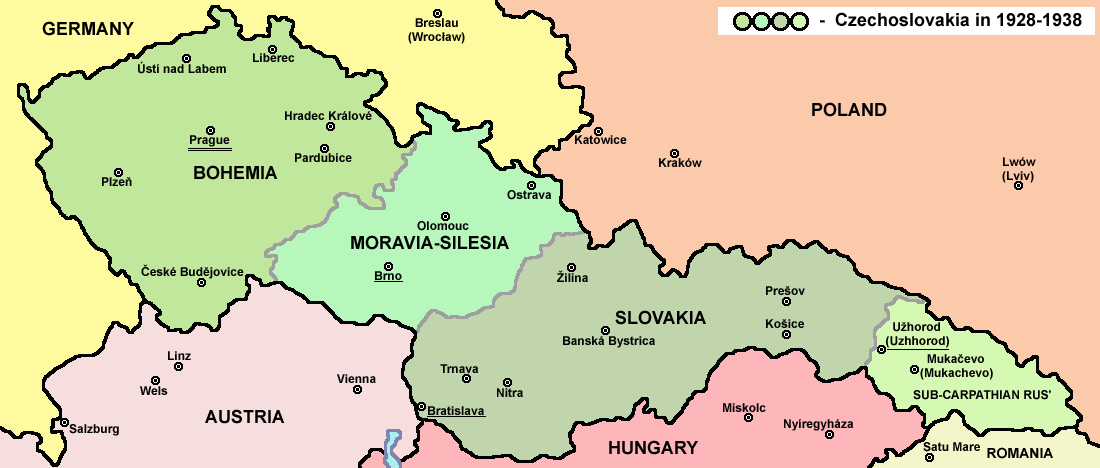May Crisis 1938 on:
[Wikipedia]
[Google]
[Amazon]
The May Crisis was a brief episode of international tension in 1938 caused by reports of German troop movements against
 With international tension already high in
With international tension already high in
Czechoslovakia
, rue, Чеськословеньско, , yi, טשעכאסלאוואקיי,
, common_name = Czechoslovakia
, life_span = 1918–19391945–1992
, p1 = Austria-Hungary
, image_p1 ...
that appeared to signal the imminent outbreak of war in Europe. Although the state of high anxiety soon subsided when no actual military concentrations were detected, the consequences of the crisis were far-reaching.
War scare
 With international tension already high in
With international tension already high in Central Europe
Central Europe is an area of Europe between Western Europe and Eastern Europe, based on a common historical, social and cultural identity. The Thirty Years' War (1618–1648) between Catholicism and Protestantism significantly shaped the a ...
after the German annexation of Austria
The (, or , ), also known as the (, en, Annexation of Austria), was the annexation of the Federal State of Austria into the German Reich on 13 March 1938.
The idea of an (a united Austria and Germany that would form a " Greater Germany ...
in March 1938 and the continued unrest in the German-speaking border regions of Czechoslovakia, the Sudetenland, reports of substantial military concentrations in areas close to Czechoslovakia on 19 May 1938 gave rise to fears of an imminent German attack. In response to the reports, originating mainly from Czechoslovak intelligence sources, Czechoslovakia mobilised a number of military reservists on 20 May and strengthened its border defences. Alarmed by the developing situation, the governments of France (Czechoslovakia's main ally) and Britain warned Germany that they would come to Czechoslovakia's aid in the event of an attack. The German government denied that potentially-aggressive troop movements had taken place, and in the absence of any real evidence of military activity, the atmosphere of acute crisis had passed by 23 May.
Aftermath
The appearance of decisive French and British diplomatic action in Berlin ran contrary to their general policy of appeasement towards Germany but ultimately served only to reinforce that policy. In the wake of the crisis, France and particularly Britain, fearful of war with Germany, intensified their pressure on the Czechoslovak authorities for concessions to theSudeten German Party
The Sudeten German Party (german: Sudetendeutsche Partei, SdP, cs, Sudetoněmecká strana) was created by Konrad Henlein under the name ''Sudetendeutsche Heimatfront'' ("Front of the Sudeten German Homeland") on 1 October 1933, some months afte ...
(SdP), which, under instructions from Nazi Germany, promoted unrest in the Sudetenland.
In Germany, being perceived to have backed down in response to Czechoslovak defensive measures and French and British diplomacy served only to reinforce hostility towards Czechoslovakia. Within a matter of days, the German leader, Adolf Hitler
Adolf Hitler (; 20 April 188930 April 1945) was an Austrian-born German politician who was dictator of Nazi Germany, Germany from 1933 until Death of Adolf Hitler, his death in 1945. Adolf Hitler's rise to power, He rose to power as the le ...
, revised the directive for Case Green, the plan to invade Czechoslovakia. The new directive, issued on 30 May 1938, was due to be carried out before the start of October 1938 and stated, "It is my unalterable decision to smash Czechoslovakia by military action in the near future".
The May Crisis was a short-lived but significant episode in 1938. Although no evidence has emerged of any aggressive German military preparations then being made, the outcome of the crisis was a significant step on the road to the Munich Agreement
The Munich Agreement ( cs, Mnichovská dohoda; sk, Mníchovská dohoda; german: Münchner Abkommen) was an agreement concluded at Munich on 30 September 1938, by Germany, the United Kingdom, France, and Italy. It provided "cession to Germany ...
and the destruction of Czechoslovakia. The identity of the source of the misleading information concerning German troop concentrations that was supplied to the Czechoslovak intelligence service and the precise motivation behind it both remain uncertain.
Hitler referred to the May Crisis in his 30 January 1939 Reichstag speech by stating that he had committed to a military invasion if Czechoslovakia did not surrender the Sudetenland by 2 October. Referencing "a serious blow to the prestige of the Reich" and an "intolerable provocation", Hitler claimed that the Sudetenland had been secured by German determination and willingness to resort to force, rather than diplomacy.
References
{{Authority control Diplomatic incidents Munich Agreement Sudetenland Territorial disputes of Czechoslovakia 1938 in international relations 1938 in Germany 1938 in Czechoslovakia Czechoslovakia–Germany relations War scare